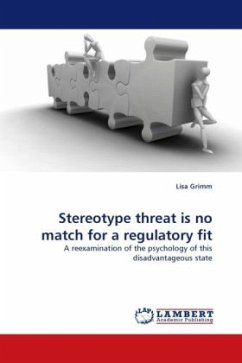Over a decade ago, academic psychologists demonstrated that low academic performance by students could be explained by negative stereotypes ascribed to their racial, gender, or cultural groups. For example, researchers have argued that the stereotype that women are bad at math leads women to underperform on math tests relative to men. This monograph describes research studies that were inspired by regulatory fit theory and reviews the literatures on stereotype threat and regulatory fit. The regulatory fit approach is used to explore the benefits of placing individuals in appropriate task environments as a way to remove the influence of the negative stereotype. As such, this monograph challenges the conventional view that it is the negative stereotype that undermines performance. Critically, this approach suggests a method to improve performance of stigmatized groups without initially embarking on the difficult task of changing cultural stereotypes. This reinterpretation of stereotype threat will be of interest to social and cognitive psychologists, educators, graduate and advanced undergraduate students, and anyone else fascinated by the influence of stereotypes on performance.
Bitte wählen Sie Ihr Anliegen aus.
Rechnungen
Retourenschein anfordern
Bestellstatus
Storno








